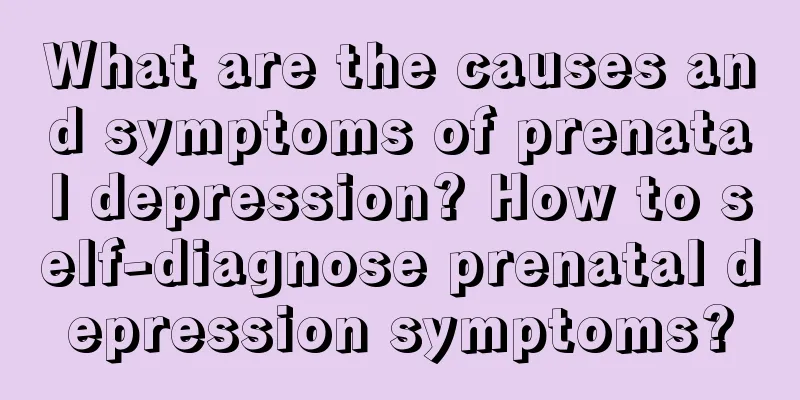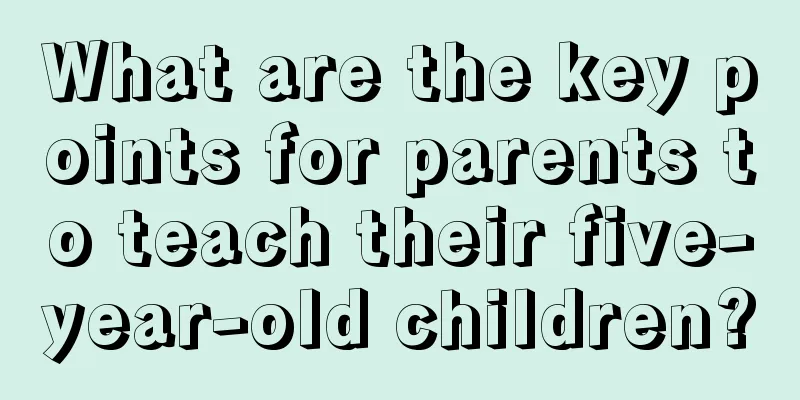What are the causes and symptoms of prenatal depression? How to self-diagnose prenatal depression symptoms?

|
After many women become pregnant, they find it difficult to accept the physiological and psychological changes. Coupled with the lack of timely counseling by their families, they are prone to prenatal depression. In severe cases, they may even harm themselves. So, what are the corresponding symptoms for this situation? What is antenatal depressionPrenatal depression is a psychological disorder during pregnancy that has received increasing attention in recent years. It refers to the various negative emotions that occur when pregnant women have some unconventional and excessive expectations of their husbands and families that are not met, or are affected by frustration, work pressure, and concerns about the health of the fetus. According to surveys, 98% of pregnant women will experience anxiety in the late stages of pregnancy. Some people are good at regulating their emotions, which can reduce their anxiety, while some people are not good at regulating, and their psychological anxiety becomes more and more serious. Causes of Antenatal DepressionHormonal changesAfter having a baby, the amount of hormones in a woman's body will change, such as the amount of neurotransmitters. Neurotransmitters can interfere with the brain's emotional regulation. Once changes occur, pregnant women are more likely to feel anxious and depressed, but the symptoms will improve after giving birth. Other factorsIf a pregnant woman has suffered from depression in the past or has a family history of depression, she is more likely to suffer from antenatal depression. In addition, if the relationship with her family, especially her husband, is not harmonious, the chances of suffering from antenatal and postnatal depression are also high. Symptoms of Antenatal DepressionThere are three main symptoms of depression: unhappiness, poor memory, and inactivity. These three symptoms are also the criteria for judging whether a pregnant woman suffers from prenatal depression. Many people are familiar with depression, but depression is fundamentally different from general "unhappiness". It has obvious characteristics, and there are three main symptoms in total, namely low mood, slow thinking and motor inhibition. 1. Feeling depressed (unhappy)Being depressed means you can't be happy, you are always sad, and even pessimistic and desperate. 2. Slow thinking (no memory)Slow thinking means that the patient feels that the brain is not working well, cannot remember things, and has difficulty thinking. The patient feels that the brain is empty and has become stupid. 3. Motor inhibition (not moving)Motor inhibition means being lazy, walking slowly, talking less, etc. In severe cases, the patient may not eat or move, and cannot take care of himself. |
<<: Reasons why babies speak late Does it mean that babies who speak late are not smart?
>>: How to deal with the relationship between the two children and avoid partiality
Recommend
How to write an essay about summer vacation? An English essay example about summer vacation
The school season is about to start. Today, I wil...
Will taking Tianxi Pills always result in a boy? Will taking Tianxi Pills result in a boy?
Tianxi Pills are a medicine that many mothers who...
Which country's brand is Dettol? Is Dettol disinfectant safe?
Everyone should be familiar with the brand of Det...
What to do if your baby has poor appetite? What to eat to stimulate appetite
Many babies have a poor appetite, but there are m...
What are the benefits and help of having a dog at home with children?
Puppies are very cute, but they are still huge fo...
What are the effects of plasticizers on children's health?
The controversy over plasticizers in food in rece...
Is toothpaste acidic or alkaline? Is toothpaste with fluoride or without fluoride better?
We all need to brush our teeth every day, so we n...
How often should I change the Aneryou earplugs? How about the Aneryou earplugs?
Earplugs are essential for people with light slee...
Is it OK for children to eat chocolate? Is it OK for children to eat chocolate?
Many children love chocolate very much. It not on...
What are the benefits of parent-child games?
Contemporary parents spend less and less time wit...
What color is normal breast milk? Which color of breast milk is most nutritious?
Mothers who have experienced breastfeeding know t...
Do you need to rinse Colgate mouthwash with water after use? How many times a day should you use Colgate mouthwash?
It is said that using mouthwash can freshen breat...
How can children prevent colds in autumn? What should we do if children catch colds in autumn?
The climate in autumn is dry and the temperature ...
Which cheese is suitable for babies? Look for original cheese
Cheese is a high-calcium food, and it tastes good...
What to do if your baby crawls around? How to avoid danger
When the baby is seven or eight months old and st...









